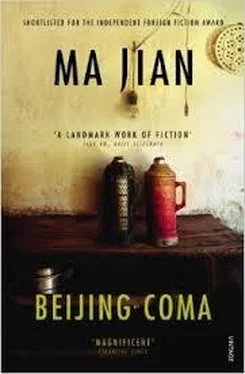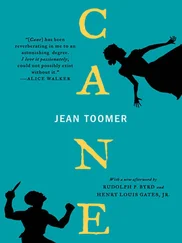‘You must be thinking of the “Land Within the Seas” chapter, where it goes: “In the south-west, near the Black River, is a land where the hundred grains grow of their own accord, germinating and flourishing both winter and summer.”’
‘Yes. It’s in Yunnan Province. And I have another wish, too: I want to set up my own laboratory.’
‘To conduct that genetic research you were talking about, growing human ear cells, or was it eye cells?’
‘Placenta cells. No, what I want to study is ways of postponing death for as long as possible.’
‘Without death we’d lose all fear and ambition.’
‘Russian scientists have successfully cloned a mouse from an embryonic stem cell. It won’t be long before we’ll see the first human clone. Before you die, you’ll be able to decide whether you want to come back to life again in another body.’
‘So my soul will live on. Maybe I’ll marry your grandson next time round.’
‘You have a rich imagination.’ I always found it an effort discussing scientific matters with non-scientists.
‘If you’re such a great scientist, try and find a way to cook those noodles.’
‘Let’s go to a restaurant,’ I said, crushing out my cigarette. ‘There’s one opposite the campus gates that sells wonton soup.’
‘You still haven’t asked me what I’ve bought you for your birthday, you fool,’ she said, handing me a book.
It was an illustrated edition of The Book of Mountains and Seas . ‘How wonderful!’ I exclaimed. Now I had pictures of the devious rabbit-faced man whose meat is succulent and sweet; the metal-eating creature that resembles a water buffalo, whose steely excrement can serve as weapons; the ‘red-jade’ grass which can put you to sleep for three hundred years. ‘I love you, Tian Yi,’ I said, then I took her in my arms and kissed her, licking her tongue and her teeth.
She clasped her hands tightly around my back and said, ‘Sorry I spoke to you like that. I’m frightened, that’s all. In psychology it’s called cherophobia — fear of happiness. I’m afraid of getting hurt. Promise me you’ll never leave me.’
‘I promise,’ I said wearily. Suddenly, the memory of Tian Yi’s appearance the first day I saw her vanished from my mind.
The bioelectric current flowing through your body spurts and fizzles, like a faltering beam passing through the cathode-ray tubes of an old television.
I can see dead fish before me, and they keep changing size. Perhaps this is a sign of approaching death. The fish have black eyes and white scales, and are lying on a bed of ice cubes. A sweet, sour smell wafts from the fruit stall behind. Everything glimmers and glints: the half-eggshells on the floor, the shiny jars of salt, the crunched-up balls of paper under the stallholder’s stool, the golden pagodas printed on the plastic shopping bags of passers-by. I can’t work out the significance of this confused scene… Another three hundred li east lie the Di Mountains. Although many rivers and streams run through their valleys, their slopes are barren. A fish that resembles an ox lives on the mountains. It hatches in summer and dies in winter… I remember Tian Yi reading that passage to me. Her voice was lower and huskier than A-Mei’s.
I see her walking towards me. I enter the scene, relieved to have a memory to latch onto.
By the time she arrived at Weiming Lake, the late-afternoon sky behind her was like a sheet of steel. Everything felt cold — the earth, the grass, the insects flying through the air. The fishy smell from the lake was less pungent than it had been at noon. Students were sitting in couples on the small patch of grass by the shore. They were all in the early stages of courtship, so their gestures looked stilted.
I’d come from a biology tutorial and was standing on the grassy slope staring at the bright sky and the path that stretched in front of me. I’d been watching people’s legs as they walked towards me. The foot would move first, then the knee would bend and the whole leg would swing forward. These were living people, undissected bodies wrapped in clothes. Whenever I saw a moving leg, my mind turned to the human muscles that floated in the specimen jars in the science lab. As the light began to fade, the legs started moving more slowly.
A guy in beige trousers walked slowest of all. He was a foreign languages student who’d recently won the university’s singing contest. He and two friends were heading for the dorm blocks, moving the muscles and bones their parents had given them. Students from the countryside, still not accustomed to wearing heavy shoes, took steps that were too large. Students from mountainous regions walked with their knees bent and chests tilted forward, as though climbing a steep slope. The drifter from Sichuan who camped in our dorm block always walked like that.
Then a pretty girl came towards me, and my attention immediately shifted to her.
Beautiful girls are used to being observed, and deliberately move their legs in a way they know will attract the male gaze. The girl who was approaching me was from the south. She was wearing denim jeans and was with a foreign student. She moved with the grace and fluidity typical of people from the coastal towns of southern China. From the sway of her hips, you could tell she was in love.
It was freezing by now, and Tian Yi still hadn’t turned up. After the sun went down, the air turned stiff. I thought of the rabbit that the technician had just killed in the science lab. As it took its last breath, it stretched its leg out as far as it could. A second later, it was a corpse ready to be dissected.
Gao Hua walked up to me. Even though she was only in her late twenties, she was serious and matronly and treated us like her younger siblings, so we all called her ‘Sister Gao’. She was studying for a PhD in philosophy. Apparently, her father was an important academic.
‘Hey, Dai Wei!’ she said. ‘How many bottles of that hair-growth lotion have you got left? A guy in our research department wants to buy one.’ She was dressed like a young professor. In fact she was a professor of sorts. Tian Yi told me that she’d given a seminar on contemporary philosophical research that had been well received.
‘I’ve sold out, I’m afraid. I’ll have another batch next week.’ My friend Sun Chunlin had been away from Shenzhen for a couple of weeks, so had been unable to replenish my supplies.
‘The Democracy Salon is organising a debate tomorrow,’ Sister Gao said. ‘Their new leader, Han Dan, will be chairing it. Your Pantheon Society hasn’t been very active this term.’ The books she was carrying looked very heavy.
‘Han Dan? You mean that lanky guy from the Chinese Department?’ I said distractedly. ‘The Pantheon Society hasn’t done much, but Zhuzi’s Law and Democracy Research Society and Hai Feng’s Social Research Student Club have been quite busy organising debates and lectures.’
The Pantheon Society had, in fact, done nothing since the summer, when Liu Gang and Shu Tong argued over how to react to the murder of a Beijing University graduate by a gang of local hooligans. Liu Gang believed that the incident provided a good excuse for launching another spate of protests. He gave speeches in the Triangle, demanding that the assailants be brought to justice, and made plans for a demonstration in Tiananmen Square. But when Liu Gang heard a rumour from Cao Ming’s father that Vice President Wang Zhen had called for a ruthless suppression of student activists, and realised that no other Beijing college was likely to join our protests, he suggested that we should organise a stroll through Tiananmen Square instead of a demonstration. He and Shu Tong argued for two weeks, until they both scrapped the idea.
Читать дальше












